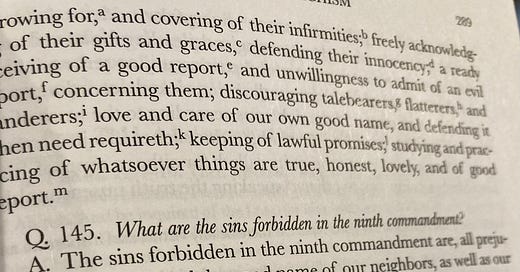Welcome to The Square Inch, a Friday newsletter on Christianity, culture, and all of the many-varied “square inches” of God’s domain. This is a paid subscription feature with a preview before the paywall, so please consider subscribing to enjoy this weekly missive along with a frequent Pipe & Dram feature of little monologues/conversations in my study, and Wednesday’s “The Quarter Inch,” a quick(er) commentary on current events.
Dear Friends,
I am still in the thick of writing an essay of the more in-depth, academic variety, which I am very much enjoying.
I am sort of chagrined at how “analogue” I remain this far into the 21st century. I am constantly pulling books off of my shelf, finding a choice quote I remember, and painstakingly typing it into my document. Students nowadays use digital everything—they’ve all got Logos software and are brilliant at finding and copying and pasting. I mean, I have Logos, too, but I don’t actually find myself using it very often for that purpose. Maybe it is one of those, “If it isn’t broke, don’t fix it” phenomena. Or maybe I am just too lazy to really learn the new technology.
I do find that in my case perusing physical books is superior for the purposes of information retention. If I search for a phrase and a program drops the results right in front of me, I do not pay nearly the critical attention to the surrounding context; a sentence an inch or two down on the page will not catch my eye. There is something about mentally grappling with a book, wrapping my mind around its organization and argument, that has far more “stickiness” for me than having a robot deliver the results. At least, I don’t make a habit of having the robot do the work for me. I won’t say I never do a search, but it is rare. My way does make things slower; but, I like to think, a bit deeper.
A few years ago, during the Covid lockdowns, I taught two major residential courses at Westminster Theological Seminary. I Zoomed in from Montana, and the students Zoomed in from wherever they happened to be. Often during my lectures a student would ask me where a certain quote came from. I would dutifully flip back through my notebook but in literally seconds another student would type the exact bibliographic reference into the chat box. I was absolutely amazed. I was being fact-checked in real-time by students using digital resources, and it was very impressive. I do not think I will ever catch up to their know-how.
Last Friday I wrote about G3 Ministries and their dismissal of President Josh Buice, who had been secretly and shamefully slandering others and sowing dissension. Today Tim Challies published a thoughtful piece on what happened, and I found it quite illuminating. It is a cautionary tale of Christian leadership. It seems to me that Buice felt himself presiding over his own little fiefdom and fancied it the kingdom of God. Drunk on self-importance, he sought to undermine anyone he, for whatever deluded reason, thought was a threat. He had, in his mind, “enemies.” Anonymity, lies, and slander were useful methods to sow chaos while maintaining his public veneer as a godly, upstanding Christian. The most enlightening part of Challies’s account is that Buice axed him from speaking at G3 unless he agreed to not post quotes or material from certain other Christian leaders or ministries. Buice figuratively had, if not literally, an “enemies” list of persona non grata.
This, apparently, is a thing with Christian leaders.
Collin Hansen of The Gospel Coalition posted a video podcast interview with Bryan Chappell, former President of Covenant Theological Seminary and current Stated Clerk of the General Assembly for the Presbyterian Church in America (PCA).
Hansen asks Chappell how the church can and should deal with the growing industry of critics and “discernment bloggers,” people who gin up controversy in the church. Hansen observes that compared to the “slow work of serving inside an institution,” outside click-bait criticism is easy and has “very large financial incentives.” This is a real problem and real question that deserves a real answer. Chappell responds:
You may have seen me glance aside, and the reason I did was—I’m going to show this to you quickly. [Holds up small piece of paper] I keep the note on my desk. Those are the names of the scandalizers, the people who have invested hours every day attacking others for their supposed lack of faithfulness, for their compromise; whose identify comes from scandalizing others. And every name on that list has either left his family, left the faith, or taken his life. Every name on that list.
It amazes me. I’ve done this for almost fifty years now, been an ordained minister. And I can tell you almost with certainty: those who—those who build their reputations on destroying the reputations of others will end up with terribly dark lives. You just cannot live in darkness in this segment of your life—I’m going to spend my life trying to make fun, mock, scandalize other people, but I’m going to be tender and precious and kind to my wife and children.
There is so much truth to that that you might wonder why this interview is becoming a big deal on social media.
Keep reading with a 7-day free trial
Subscribe to The Square Inch to keep reading this post and get 7 days of free access to the full post archives.





